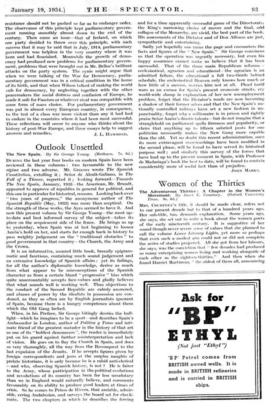Outlook Unsettled
The New Spain. • By Sir George Young. (Methuen. 7s. 6d.)
DURING the last year four books on modern Spain have been reviewed in these columns : two favourable to the new regime and two adverse. Mr. Greaves wrote The Spanish Constitution, extolling it ; Seiior de Aleala-Galiano, in The Fall of a Throne, regretted it ; looking forward—Towards The New Spain, January, 1933—the American, Mr. Brandt, appeared to approve of republics in general for political, and this one in particular for historical, reasons. Looking back over
two years of progress," the anonymous author of The Spanish Republic (May, 1933) was more than sceptical. On the strength of these works, the Ayes seemed to have it. And now this present volume by Sir George Young—the most up- to-date and best informed survey of the subject—takes its place on the acquiescent side of the fence. He brings us up to yesterday, when Spain was at last beginning to loosen Azaiia's hold on her, and starts far enough back in history to pass weighty judgement on the " traditional obstacles " to good government in that country—the Church, the Army and the Crown.
It is an informative, assured little book, breezily epigram- matic and facetious, containing much sound judgement and an extensive knowledge of Spanish affairs : yet its failings, for all the author's diplomatic knowledge, derive as much from what appear to be misconceptions of the Spanish character as from a certain bland " progressive " bias which quite unaccountably accepts face-values and gladly believes that what sounds well is working well. Thus objections to the conduct of the Second Republic are calmly answered, and abuses of power by the idealists in possession are con- doned, as they so often are by English journalists ignorant of Spain, because there is a hungry competence about them which the Old Gang lacked.
When, in his Preface, Sir George bitingly decries the bull- fight—which he imagines to be a sport—and describes Spain's Ambassador in London, author of Politica y Toros and inti- mate friend of the greatest matador in the history of that art as one of its " boldest denouncers", the reader is immediately put on his guard against further misinterpretation and lack of vision. He goes on to flay the Church in Spain, and does so very thoroughly, all the way from the- Reconquest to the last expulsion of the Jesuits. If he accepts figures given by foreign correspondents and jeers at the surplus naughts of prelate historians, it is only because he is a rabid anti-clerical —and who, observing Spanish history, is not ? He is fairer to the Army, whose participation in the political evolutions and revolutions of its country has been far less unsalutary than we in England would naturally believe, and comments favourably on its ability to produce good leaders at times of crisis. So he comes to Primo de Rivera, that amiable, admir- able, erring Andalusian, and surveys the board set for check:, mate. The two chapters in which he describes the forcing
and for a time apparently successful game of the Directorate, the King's narrowing choice of moves and the final, odd collapse of the Monarchy, are vivid, the best part of the book. His assessments of the Dictator and of Don Alfonso are just, sympathetic and entertaining.
Sadly yet hopefully one turns the page and encounters the facts and figures of the New Spnin." Sir George convinces us that the operation was urgently necessary, but even his happy assurance cannot make us believe that it has been successful. That of the three main Republican reforms— ecclesiastical, agrarian and educational—the agrarian is an admitted failure, the educational a full two-thirds behind schedule, the ecclesiastical heaven only knows how much or how little of a success, worries hint not at all. Plead tariff wars as an excuse for Spain's present economic straits, cry world-wide slump in explanation of her new unemployment problem, forget that the Dictator's roads are now becoming a shadow of their former selves and that the New Spain's na- tionally controlled railways have set a new fashion in tut- punctuality, forget why a millionaire is in prison and rightly praise Senor Azaria's drastic talents—but do not imagine that a stranglehold on parliament spells firmness and popularity, or claim that anything up to fifteen salaried posts for one politician necessarily makes the New Gang more capable than the old. Yet no doubt this recent administration, once its more extravagant over-reachings have been modified in the second phase, will be found to have served its historical purpose well ; and similarly this survey of the forces that have lead up to the present moment in Spain, with Professor de Madariaga's book the best to date, will be found to contain considerably more of useful fact than of prejudice.
Joins MARKS.








































 Previous page
Previous page